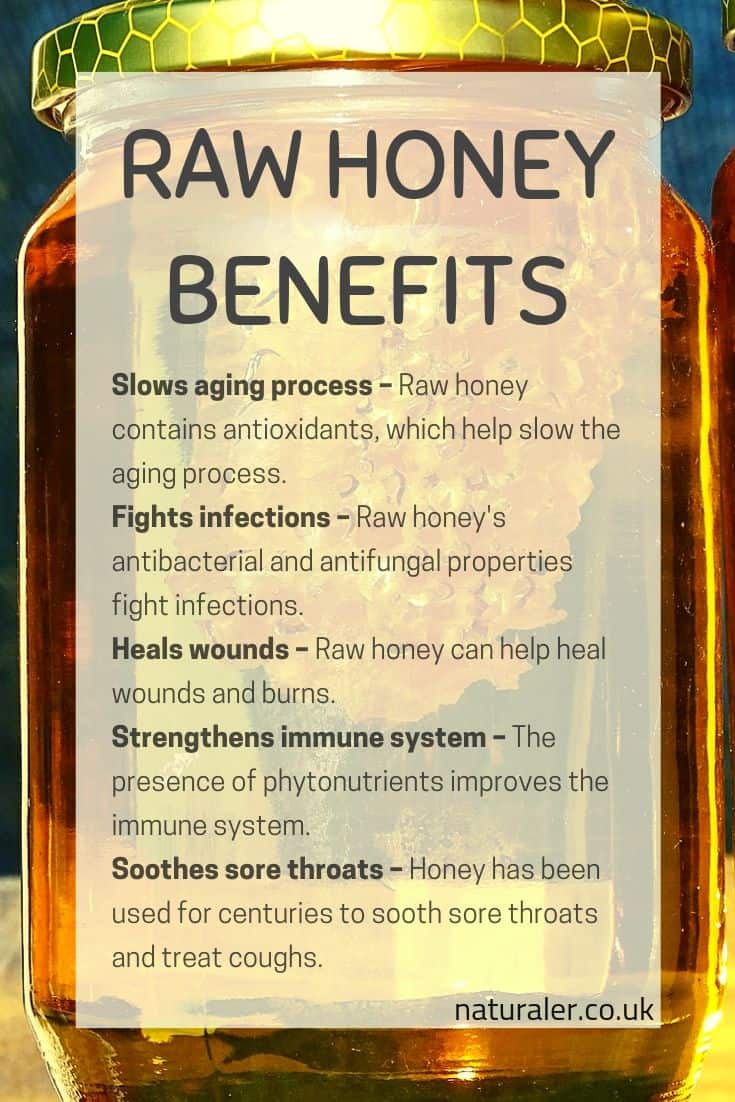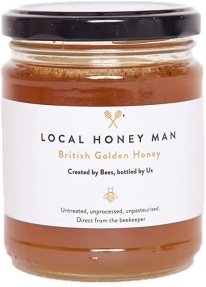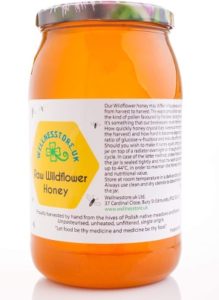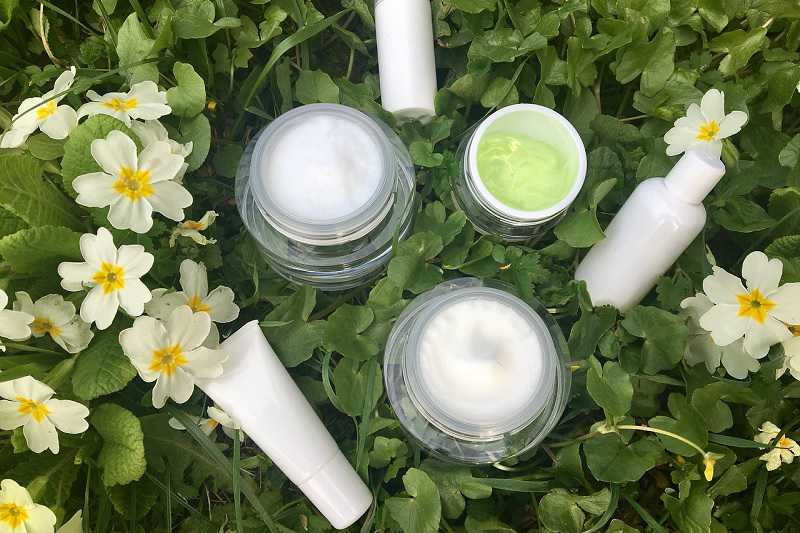Raw honey is simply honey that hasn’t been pasteurised, heated significantly above 35°C, or processed.
It’s just pure honey the way nature intended it to be.
Pasteurisation helps improve its shelf life, but also kills the beneficial yeast and enzymes found in raw honey.
The temperature of a beehive is about 35°C, and many ‘raw’ kinds of honey are heated slightly to about 38°C, but this isn’t enough to kill the beneficial enzymes in the honey.
You can buy local raw honey direct from beekeepers, or order raw honey online.
Below we have reviewed some of the best raw honey available in the UK.
Table of Contents
Best Raw Honey in the UK
1. Black Bee Summer Honey
Country of origin: UK
Packaging: Glass jar
Black Bee honey is about as close as you can get to buying local honey while still having the convenience of being able to order it online.
Unlike most kinds of honey on the market, this product is made exclusively from honey produced in the UK.
It also comes in a recyclable glass jar, so it’s environmentally friendly.
This honey comes from bees that feed on a range of wildflowers in Exmoor and the Cotswolds.
In addition to the Summer Honey variety, the company also sells a range of other British kinds of honey including a variety produced in London.
Black Bee Summer Honey is unpasteurised, unblended, and coarse filtered, so it retains all the benefits of raw honey.
Black Bee Honey is a relatively new company founded by Chris Barnes & Paul Webb, who raised over £100,000 in crowdfunding to help launch the brand.
Most people agree that this honey tastes great, though it’s quite different from supermarket-bought honey so it may take some getting used to.
2. Just Bee Raw Vitamin Honey (Lemon & Ginger)
Country of origin: UK
Packaging: Glass jar
Just Bee blends their raw honey with Vitamins C, B6, B12, and Echinacea to make Raw Vitamin Honey.
Just a teaspoon of this raw vitamin honey contains nearly 25% of your recommended daily allowance (RDA) of Vitamin C, B6, and B12.
The vitamin honey is available in original, and lemon and ginger types. Just Bee also has Manuka raw vitamin honey.
Just Bee was started by a family of beekeepers with an aim to create healthy products and to save the bees.
With every order, they send out a pack of bee-friendly wildflower seeds which customers can plant to help reverse the decline in the bee population in Britain.
They set a high standard for the quality of their honey. To ensure this, they have regular tests such as HMF, antibiotic, water%, microbiological, foreign sugars, activity testing, and vitamin testing.
3. Baltic Honey Shop Pure Raw Honey
Country of origin: Lithuania
Packaging: Glass Jar
At the time of writing, Baltic Honey Shop’s Pure Raw Honey is one of the most popular raw honey on the market in the UK.
This honey comes from Lithuania and is unpasteurised and unfiltered, with no added ingredients.
Baltic Honey Shop’s honey is crystallised, but you can soften it so it’s spreadable.
It comes in a recyclable glass jar, which is good if you’re looking to go plastic-free.
You can buy Baltic Honey Shop honey in a range of varieties based on what the bees were feeding on. These include ‘Sunflower’ ‘Forest Field’, and ‘Orchard’ and more.
Most people love the taste of this honey, though this is of course subjective. Some people find that it has a strong and unpleasant smell.
4. Local Honey Man British Golden Honey
Country of origin: UK
Packaging: Glass jar
Local Honey Man is a London-based ethical honey brand run by Curtis Thompson, who swapped a job in investment banking to pursue his passion for beekeeping.
This honey is produced by bees from several hives in London and Essex, which feed on pollen from a range of plants including daffodils, blackberries, lavender, pear, and clover. It’s cold extracted and coarse filtered.
While London may not sound like an ideal place to produce honey, the capital actually provides bees with a large range of plants to feed on due to the number of parks and gardens.
In addition to plain raw honey, Local Honey Man also sells a range of honey infused with natural flavourings such as lemon zest and cinnamon.
If you want to have this honey delivered regularly, you can sign up for a subscription package, which would make a great gift for a honey lover.
Most people who try this honey find it to have a richer and more satisfying taste than supermarket-bought honey.
5. Steens Raw 15+ Manuka Honey
Country of origin: New Zealand
Packaging: BPA-free plastic jar
This New Zealand-made manuka honey is raw and unpasteurised. It’s only heated to 36°C, so its unique nutritional properties are preserved.
It’s a bit pricey, but unlike some other brands, you know you’re getting genuine raw manuka honey.
This honey has a Unique Manuka Factor (UMF) of 15+. The UMF rating measures the levels of leptosperin, methylglyoxal, DHA, and HMF in the honey. Honey with a UMF of 15+ has at least 514 mg of methylglyoxal per kg of honey.
Unlike regular honey that is produced by bees feeding on nectar from a variety of plants, manuka honey is produced by bees that feed exclusively on the nectar of the manuka tree, which is native to New Zealand.
Some studies have found that manuka honey can slow the rate at which bacteria multiply and help with wound healing. For these reasons, a lot of people use manuka to help them get over coughs, colds, and infections.
One downside to buying this honey is that it isn’t the most environmentally friendly option since it’s imported from New Zealand and comes in a plastic (though BPA-free) jar.
Like most manuka kinds of honey, this product is quite expensive when compared to regular honey.
6. Wellnesstore.uk Raw Wildflower Honey
Country of origin: Poland
Packaging: Glass jar
This pure honey from Wellnesstore.uk comes from the pristine Bieszczady Mountains in Southern Poland.
It’s 100% raw and unpasteurised, with no added ingredients.
Like most raw honey, this product arrives crystallised, but you can make it runny again just by warming it up a bit.
This honey comes in a large 1.25 kg jar, so it should last a while. It has a great flavour and tastes like honey is supposed to.
7. Igmis Natural Raw Wild Flower Honey
Country of origin: Moldova and Ukraine
Packaging: BPA-free plastic jar
This raw honey comes from beehives in Moldova and Ukraine. It’s sold in a large 1.5 kg jar that offers good value for money and should keep you going for a while!
This polyfloral honey is filtered, unpasteurised, and doesn’t contain any artificial flavours or added sugars and preservatives. It’s runny at first but will set over time. Once it has been set, you can make it runny again by heating it up.
It comes in a BPA-free plastic jar which means it’s less likely to leak or break during shipping. The packaging is very attractive and the plastic jar is lighter than a glass jar would be, though less environmentally friendly.
8. Na’vi Absolutely Pure Raw Unpasteurized Living Honey
Country of origin: Romania
Packaging: Glass jar
This raw honey from Na’vi Organics comes from hives in rural mountainous areas in Romania. It’s unprocessed, retaining as many natural antioxidants and live enzymes as possible.
Most people agree this honey tastes delicious and has a much richer taste than supermarket-bought honey. It may arrive set but should become soft again when left at room temperature.
Na’vi Organics is an organic superfood and supplement brand based in Acharacle in the Scottish Highlands.
9. Bee Roots Acacia Honey
Country of origin: Bulgaria
Packaging: Glass jar
Bee Roots is a brand created by the founder Jason to promote ethical beekeeping and sustainable practices. They aim to give back to nature by regenerating natural habitats and restoring biodiversity.
They follow a strictly organic and cruelty-free process to produce fine raw honey.
Bee Roots collect only excess honey, practices balanced bee-keeping, and never feed sugar syrup to the bees.
If you are a vegetarian or a vegan concerned about the treatment these remarkable insects are subjected to, Bee Roots is definitely a brand you can try without feeling guilty.
The Acacia honey is harvested in spring and named after the acacia flowers. It is made from the nectar from the black locust tree.
It is light and almost transparent with a soft floral aroma. It has a smooth, runny texture and is slower to crystalize compared to other types of honey.
Bee Roots also has a few other variants such as linden honey, white honey, and wild Sunflower honey.
10. London Honey Co’s British Honey Trio
Country of origin: UK
Packaging: Glass jar
The London Honey Co. sells raw, unpasteurized honey mainly from the Sailsbury plains, Essex, Oxfordshire, Shropshire, and London. However, they also sell organic honey from the Zambian forests.
Their honey is raw and unpasteurized. It is minimally filtered but said to retain natural properties.
Their honey is available for purchase in packs of 2, 3 and 6 different varieties.
The British honey trio pack has Dorset Summer, Scottish Ling Heather, and Kent Creamed.
They also have Turmeric, and vanilla and ginger flavoured honey.
You can also buy pure and raw honeycombs from the London Honey Co.
Potential Benefits of Raw Honey
Here are some of the top health benefits of raw honey:
- Slows aging process – Raw honey contains antioxidants, which help slow the aging process and can protect against diseases.
- Fights infections – Can be used to fight infections due to its antibacterial and antifungal properties.
- Heals wounds – Raw honey can help heal wounds and burns.
- Strengthens the immune system – The presence of phytonutrients improves the immune system.
- Soothes sore throats – Honey has been used for centuries to soothe sore throats and treat coughs.

Uses of Raw Honey
As well as just eating it, there are hundreds of ways to use raw honey.
Some of the most popular uses are listed below:
- Skincare – Raw honey can be used on the skin to treat acne, scarring, wounds, eczema, warts, wrinkles, vitiligo, pimples, and dermatitis. Lots of people make face masks using raw honey to treat acne.
- Colds and flu – Raw honey can be used to treat coughs, sore throats, colds, and flu.
- Mouth rinse – Raw honey can be used as a mouth rinse to treat sensitive teeth and ulcers.
- Acid reflux – Raw honey can be used to treat GERD and acid reflux.
- Joint health – Raw honey can be used to ease arthritis symptoms and joint pain.
- Treat for dogs – You can give a small amount of raw honey to dogs as an occasional treat.
In some home remedies, raw honey is combined with other ingredients such as garlic, lemon juice, cinnamon, apple cider vinegar or turmeric.
Raw Honey FAQs
Here are the answers to some frequently asked questions about raw honey.
What is raw honey?
There isn’t a universally agreed-upon definition for “raw honey”. Most people agree that raw honey is honey that:
- Has not been pasteurised (heated)
- Has not been filtered
It is extracted from the hive and put in jars without any special treatment or processing. Almost all honey from small-scale honey producers and farmer’s markets is ‘raw’.
Why isn’t honey labelled as ‘raw’ in the UK?
Food labelling regulations in the UK no longer allow honey producers to label their honey as ‘raw’. This is because legislators believe that adding the word ‘raw’ implies that this honey has special qualities, which isn’t necessarily the case.
Is supermarket honey fake in the UK?
A lot of websites talk about how the majority of supermarket honey is ‘fake’. This is a real problem in the US, but not in the UK where honey standards are much stricter.
With the exception of honey labelled as ‘Filtered’, you’re not allowed to label as a product as ‘honey’ if the pollen has been removed:
“No pollen or constituent particular to honey may be removed except where this is unavoidable in the removal of foreign inorganic or organic matter.” – Source: The Honey (England) Regulations 2015
This is very different from in the US, where a 2011 study found that over 75% of supermarket honey didn’t contain pollen (source).
However, since Europe consumes more honey than it produces, a lot of honey is imported from countries such as China, which have laxer regulations.
It’s difficult to mass-test imported honey, and as a result “honey fraud” is a real problem – see this fascinating article.
Honey fraud can involve practices such as harvesting honey before it’s ready, resulting in higher yields but lower quality, watery honey. Unscrupulous producers can also remove pollen to hide the country of origin or dilute honey with syrups.
While the majority of supermarket honey is relatively high quality in the UK, buying directly from a local producer is the best way to be sure you’re getting the real thing.
Is raw honey safe?
Despite not being pasteurised, raw honey should be perfectly safe for most people except babies and pregnant women. However, there are a few potential risks:
- Botulism – Raw honey should be safe for healthy adults, but it can be dangerous for pregnant women and babies under a year old as it can contain spores of the bacteria clostridium botulinum. These bacteria can cause botulism, a very rare condition with symptoms including muscle weakness. Most people recover from botulism, but it is fatal in roughly 5-10% of cases. The body builds up defences against clostridium botulinum after the age of about 1, so there older children and adults shouldn’t be at risk of contracting botulism from raw honey.
- Allergic reaction – Raw honey can also contain allergens such as pollen, triggering an allergic reaction.
- Grayanotoxin poisoning – When honey is made by bees that feed on rhododendron plants containing grayanotoxins (a group of neurotoxins), it can cause grayanotoxin poisoning, also known as “mad honey poisoning”. Some symptoms of this include nausea and vomiting. If honey tastes bitter and/or causes a burning sensation in the throat, it may contain grayanotoxins and should be discarded. In some parts of the world, “mad honey” is produced on purpose and consumed as a recreational drug.
Is raw honey vegan?
Whether or not honey is vegan is a hotly contested topic in the vegan community. Some people argue that since honey is made by bees, it isn’t vegan, while others believe this stance is too strict.
See this article for an overview of the arguments for and against honey being vegan.
Is raw honey the same as organic honey?
No. Raw honey can be organic, but it doesn’t have to be and often it isn’t. When talking about honey, ‘organic’ refers means that the plants and flora the bees feed on are organic.
Usually, beekeepers don’t know exactly where their bees go, so they can’t guarantee that their bees are always feeding on organic plants.
Lots of people interested in raw honey want to buy organic honey, but British beekeepers can’t actually be certified organic as they can’t guarantee that their bees only visit organically grown flowers.
Is raw honey good for your skin?
Raw honey has anti-inflammatory and anti-bacterial properties, and many people believe it helps moisturise and exfoliate the skin.
Its anti-bacterial properties could help reduce acne, while the antioxidants it contains could help slow down skin aging. This study looks at the potential applications of honey in treating skin disorders.
Is raw honey fattening?
If consumed in high quantities, raw honey could be fattening. Honey is a very calorie-dense food and actually contains more calories per tablespoon than pure sugar (64 calories compared to 46 for sugar).
However, as long as you consume it in moderation and consume a sensible number of calories overall each day, it won’t make you fat.
Can raw honey be runny?
Raw honey usually crystallises when stored at a low temperature, but will become liquid again when heated.
Does raw honey go bad?
Raw honey should last for a very long time. However, it can go bad if it’s contaminated with something, contains toxic compounds or isn’t stored in an airtight container. Raw honey, therefore, does not need to be stored in the fridge, and it is better if it is not. It is recommended to store raw honey in a dry cupboard at room temperature.
Why is raw honey more expensive?
There are a few reasons why raw honey is usually more expensive than regular honey:
- Raw honey is viscous, whereas pasteurised honey is heated up, making it liquid. This makes pasteurised honey easier and quicker to put into jars.
- Raw honey manufacturers are usually small-scale producers, so they don’t benefit from the economies of scale that large producers can use.
Conclusion
If we had to pick just one of these kinds of honey to recommend it would be Black Bee Summer Honey as it’s produced in the UK, comes in a recyclable glass jar, and is made by a small company that is clearly passionate about making raw, natural honey (read about their story here).

Laurence is the founder and editor of Naturaler. He’s been working in the online world for over 5 years and is trying to live a more natural and eco-friendly lifestyle every day.











If the honey is not pasteurised, is it safe from harmful bacteria?
Thanks for your comment, we have updated the article to address safety issues.